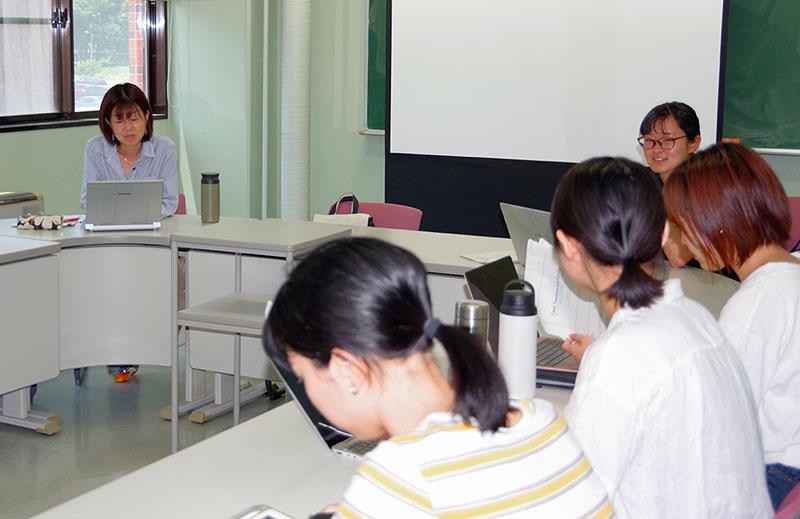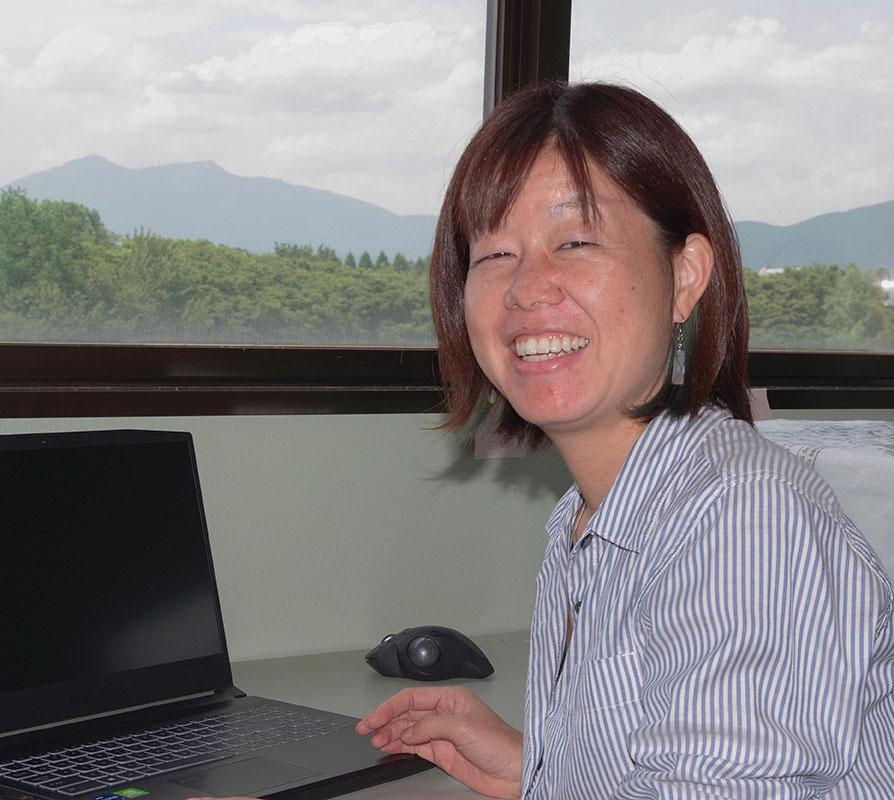TSUKUBA FUTURE
#122 Pay It Forward
Assistant Professor MATSUSHIMA Midori, Institute of Humanities and Social Sciences

The COVID-19 pandemic has had a profound global impact, leading to increased social isolation and deterioration of mental health. Japan has witnessed a surge in suicides since 2020, marking the first rise in 11 years, with no signs of reduction. What factors are contributing to this concerning trend?
MATSUSHIMA specializes in international public policy and employs applied econometrics, a statistical method for analyzing real-world problems. Her research focuses on understanding how public policies and social systems affect individuals' physical and mental well-being. Additionally, she investigates interventions that can effectively improve overall well-being.
In May 2023, MATSUSHIMA published the results of an analysis based on data obtained from a nationwide survey involving 26,000 participants (JACSIS survey*). Her study, conducted in collaboration with Professor TACHIKAWA Hirokazu and his colleagues at the Institute of Medicine, revealed that loneliness exerts a more significant influence on suicidal ideation than economic hardship or social isolation. The research found that the rapid exacerbation of loneliness during the COVID-19 pandemic had the strongest impact on the onset of suicidal thoughts in women.
Notably, loneliness is a subjective experience and differs from social isolation, which is an objective state of being disconnected from one's social network. However, social isolation can contribute to loneliness. Taking this difference and interconnectedness into consideration, it was necessary to reveal how this factor interact and affect suicidal ideation, which had previously been unclear.
MATSUSHIMA emphasized, "The impact of loneliness on suicide has only become more pronounced with the COVID-19 pandemic; yet it has probably always been the case. The COVID-19 crisis became a wake-up call, making it more apparent that loneliness measures, such as psychological support for people who are feeling lonely, are essential in addition to solving social isolation for suicide prevention."

When reading academic papers with my students, I frequently emphasize the importance of understanding what the results mean rather than simply accepting the numbers at face value.
MATSUSHIMA's current concern revolves around the intergenerational transmission of health disparities, particularly the recognition that such disparities are a result of societal conditions rather than individual responsibility. In a paper published last February, she analyzed statistical data from Cambodia and discovered that women who were born during the Khmer Rouge regime (1975-79), a period marked by genocide during the Cambodian Civil War, were at a higher risk of giving birth to low birth weight babies. This finding demonstrates the intergenerational transmission of the negative effects of inadequate nutrition during childbirth. MATSUSHIMA remarked, "Conflicts still persist in Ukraine and elsewhere. We want to eliminate the disparity, at least at the time of birth. There are many things we can do."
Next, let us consider how pregnant and post-partum mothers in Japan have been affected by the COVID-19 pandemic. From May 2020 to February 2021, MATSUSHIMA and her colleagues distributed online questionnaires three times to pregnant and post-partum women who were utilizing online services provided by companies specializing in pregnancy, childbirth, and childcare. The researchers sought to understand their experiences and concerns.
Each survey indicated that approximately 20-30% of expectant mothers were classified as depressed, representing a doubling of the pre-pandemic figure. Analysis of the responses revealed that the rise in depression among these women was attributable to economic factors and the fear of facing criticism for taking their children to public spaces.
MATSUSHIMA analyzed, "What worsened the mental health of pregnant and post-partum women due to the COVID-19 pandemic was not the fear of infection but rather the weakening of human connections caused by policies and people's excessive reaction that they should refrain from human contact."
Utilizing the JACSIS survey, MATSUSHIMA also examined data of women aged 18-50 years who intended to become pregnant. This research, conducted in collaboration with Professor KONDO Naoki at the Graduate School of Medicine and School of Public Health, Kyoto University, as well as researchers from other universities, revealed that approximately 20% of these women postponed pregnancy owing to the COVID-19 pandemic. Interestingly, the primary reason underlying this decision was not the fear of contracting the virus but rather concerns about the economic downturn and anxiety toward future caused by the crisis. These findings hold significance for shaping future policies aimed at addressing declining birthrates.

In my laboratory overlooking Mt. Tsukuba. (She also enjoys trail running).
MATSUSHIMA's research approach is characterized by active engagement in joint research projects with scholars from diverse fields, private companies, and NGOs, as well as an emphasis on social implementation. She firmly believes that addressing contemporary societal challenges requires collaboration across multiple academic disciplines and sectors rather than relying on one field or academia alone.
The driving force behind her endeavors is her desire to "give back to society the good fortune that has allowed me to live until now." This inclination was sparked during her childhood experiences in Cairo, Egypt, where she encountered numerous street children and started to hope to work for an international organization to assist such vulnerable individuals in the future. After completing high school in Japan, she pursued Development Studies at the University of East Anglia (UEA) in England.
During her time at the UEA, she interned at an orphanage in India, where she gained firsthand experience supporting infants with disabilities. Following graduation, she became a project manager for a Japanese NGO engaged in medical assistance programs in Cambodia and Laos. It was through her involvement in these support activities that she realized the importance of empowering local communities to pursue their aspirations. To achieve this, she recognized the significance of nurturing highly skilled local individuals who could make a difference at the local level.
As a first step toward this goal, MATSUSHIMA decided to advance her education by enrolling at the graduate school of Osaka University, where she obtained a PhD. in International Public Policy in 2015. In April 2019, she joined the University of Tsukuba, which appealed to her due to the significant presence of international students who share her desire to contribute to their respective home countries through the knowledge they acquire. Among the graduate students she currently supervises are individuals from Bangladesh, Pakistan, and Mongolia.
MATSUSHIMA's focus also extends to public policy in Japan. She emphasizes, "In Japan, things often move forward without policy evaluation. I want to reveal the merits and demerits of policies for better policy to improve people's well-being."
Article by Science Communicator at the Bureau of Public Relations
* Japan COVID-19 and the Society Internet Survey (JACSIS; Representative: Associate Director Takahiro TABUCHI, Osaka International Cancer Institute)


